|
|
|
Sort Order |
|
|
|
Items / Page
|
|
|
|
|
|
|
| Srl | Item |
| 1 |
ID:
137144
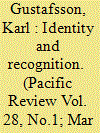

|
|
|
|
|
| Summary/Abstract |
In the 1990s, Japanese views of China were relatively positive. In the 2000s, however, views of China have deteriorated markedly and China has increasingly come to be seen as ‘anti-Japanese’. How can these developments, which took place despite increased economic interdependence, be understood? One seemingly obvious explanation is the occurrence of ‘anti-Japanese’ incidents in China since the mid-2000s. I suggest that these incidents per se do not fully explain the puzzle. Protests against other countries occasionally occur and may influence public opinion. Nonetheless, the interpretation of such events arguably determines their significance. Demonstrations may be seen as legitimate or spontaneous. If understood as denying recognition of an actor's self-identity, the causes of such incidents are likely to have considerably deeper and more severe consequences than what would otherwise be the case. Through an analysis of Japanese parliamentary debates and newspaper editorials, the paper demonstrates that the Chinese government has come to be seen as denying Japan's self-identity as a peaceful state that has provided China with substantial amounts of official development aid (ODA) during the post-war era. This is mainly because China teaches patriotic education, which is viewed as the root cause of ‘anti-Japanese’ incidents. China, then, is not regarded as ‘anti-Japanese’ merely because of protests against Japan and attacks on Japanese material interests but for denying a key component of Japan's self-image. Moreover, the analysis shows that explicit Chinese statements recognising Japan's self-identity have been highly praised in Japan. The article concludes that if China recognises Japan's self-understanding of its identity as peaceful, Japan is more likely to stick to this identity and act accordingly whereas Chinese denials of it might empower Japanese actors who seek to move away from this identity and ‘normalise’ Japan, for example, by revising the pacifist Article Nine of the Japanese constitution.
|
|
|
|
|
|
|
|
|
|
|
|
|
|
|
|
| 2 |
ID:
172286
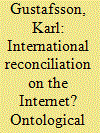

|
|
|
|
|
| Summary/Abstract |
This article explores the Internet’s often touted potential for facilitating reconciliation. It conceptualises Wikipedia as a site for collective memory construction and analyses the Chinese- and Japanese-language entries on the bilaterally contentious Second Sino-Japanese War. It addresses the question of how to make sense of the construction of these online collective memory narratives theoretically. Both historical determinism and instrumentalism – two influential theoretical approaches to collective memory and reconciliation – have great difficulties in fully accounting for this case. Instead, it is argued that ontological security theory is better equipped for understanding collective memory construction in Wikipedia. It is suggested that ontological security seeking can impede efforts for reconciliation even when, as in Wikipedia, there exist norms seeking to promote more neutral narratives. It is argued that a subtle bias in favour of the in-group and against the out-group functions as a mechanism for ontological security management that protects a positive self-identity.
|
|
|
|
|
|
|
|
|
|
|
|
|
|
|
|
| 3 |
ID:
133967
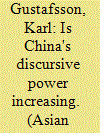

|
|
|
|
|
| Publication |
2014.
|
| Summary/Abstract |
The idea that China's rise, and more specifically its increased material capabilities, are about to produce a power shift in East Asia raises the question whether the Chinese government's ability to produce effects through discursive power has also increased. The government's use of discourses about China's war against Japan is a conspicuous example of attempts to exercise discursive power. Has China's ability to use the past for political purposes increased as its material capabilities have grown? To answer this question, I theorize on the use of discourses about the past on three levels-domestic, bilateral, and international. My analysis demonstrates that notwithstanding its increased material capabilities, the Chinese government's discursive power has actually decreased.
|
|
|
|
|
|
|
|
|
|
|
|
|
|
|
|
| 4 |
ID:
137135
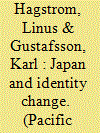

|
|
|
|
|
| Summary/Abstract |
Two approaches to identity have been employed to explore issues in Japan's international relations. One views identity as constituted by domestic norms and culture, and as constitutive of interests, which in turn cause behaviour. Proponents view Japan's ‘pacifist’ and ‘antimilitarist’ identity as inherently stable and likely to change only as a result of material factors. In the other approach, ‘Japan’ emerges and changes through processes of differentiation vis-à-vis ‘Others’. Neither ‘domestic’ nor ‘material’ factors can exist outside of such identity constructions. We argue that the second, relational, approach is more theoretically sound, but begs three questions. First, how can different identity constructions in relation to numerous Others be synthesised and understood comprehensively? Second, how can continuity and change be handled in the same relational framework? Third, what is the point of analysing identity in relational terms? This article addresses the first two questions by introducing an analytical framework consisting of three mutually interacting layers of identity construction. Based on the articles in this special issue, we argue that identity entrepreneurs and emotions are particularly likely to contribute to change within this model. We address the third question by stressing common ground with the first approach: identity enables and constrains behaviour. In the case of Japan, changes in identity construction highlighted by the articles in this special issue forebode a political agenda centred on strengthening Japan militarily.
|
|
|
|
|
|
|
|
|
|
|
|
|
|
|
|
| 5 |
ID:
162728
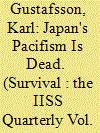

|
|
|
|
|
| Summary/Abstract |
Japan can now do more or less everything that other, more ‘normal’ countries do in the security field.
|
|
|
|
|
|
|
|
|
|
|
|
|
|
|
|
| 6 |
ID:
181659
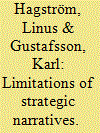

|
|
|
|
|
| Summary/Abstract |
Recent research has explored how the Sino-American narrative struggle around COVID-19 might affect power shift dynamics and world order. An underlying assumption is that states craft strategic narratives in attempts to gain international support for their understandings of reality. This article evaluates such claims taking a mixed-methods approach. It analyzes American and Chinese strategic narratives about the pandemic, and their global diffusion and resonance in regional states that are important to the U.S.-led world order: Australia, India, South Korea, Turkey, and the United Kingdom. While the article confirms that strategic narratives remain a highly popular policy instrument, it argues that their efficacy appears limited. Overall, the five states in question either ignored the Sino-American narrative power battle by disseminating their own strategic narratives, or they engaged in “narrative hedging.” Moreover, even China’s narrative entrepreneurship was enabled and constrained by pre-existing master narratives integral to the current U.S.-led world order.
|
|
|
|
|
|
|
|
|
|
|
|
|
|
|
|
| 7 |
ID:
167609
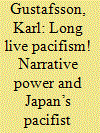

|
|
|
|
|
| Summary/Abstract |
International relations research acknowledges that states can have different security policies but neglects the fact that ‘models’ may exist in the security policy realm. This article suggests that it is useful to think about models, which it argues can become examples for emulation or be undermined through narrative power. It illustrates the argument by analysing Japan’s pacifism—an alternative approach to security policy which failed to become an internationally popular model and, despite serving the country well for many years, has even lost its appeal in Japan. Conventional explanations suggest that Japan’s pacifist policies were ‘abnormal’, and that the Japanese eventually realized this. By contrast, this article argues that narratives undermined Japan’s pacifism by mobilizing deep-seated beliefs about what is realistic and unrealistic in international politics, and launches a counter-narrative that could help make pacifism a more credible model in world politics.
|
|
|
|
|
|
|
|
|
|
|
|
|
|
|
|
| 8 |
ID:
167604


|
|
|
|
|
| Summary/Abstract |
We are living at a time when people appear to have become more aware of the power of narratives in international politics. Understanding how narratives exercise power is therefore more pertinent than ever. This special issue develops the concept of narrative power for international relations research by focusing on East Asia—the region that has been at the centre of debates about international power shifts since the 1990s. This introduction seeks to elucidate and define four key binary distinctions: (a) narrative power as understood from the perspective of an individualist versus a narrative ontology; (b) narrative power as explanandum versus explanans; (c) narrative power as more prone to continuity or change; and (d) the scholar as a detached observer of narrative power versus the scholar as a narrative entrepreneur and a potential wielder of power. Informed by the individual contributions, the introduction demonstrates how and with what implications research on narrative power can negotiate and traverse these binary distinctions.
|
|
|
|
|
|
|
|
|
|
|
|
|
|
|
|
| 9 |
ID:
147686
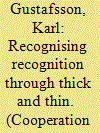

|
|
|
|
|
| Summary/Abstract |
Research on recognition in International Relations has demonstrated that states are not exclusively concerned about their physical security, but also anxious to be recognised by other states. What counts as recognition and non-/mis-recognition, however, is not always clear. Scholars of recognition seem to agree that recognition theory has not yet developed a persuasive way of recognising recognition. Providing a satisfactory answer to the question of how we recognise recognition and its denial is a necessary first step towards being able to convincingly theorise about recognition. This is especially important since recognition is often treated as a dependent variable—how states are recognised by other states is seen as influencing their behaviour, sometimes with military conflict as the outcome. This article further develops the concepts of ‘thin’ and ‘thick’ recognition as it addresses the problem of how to recognise recognition. Based on an analysis of empirical material on what, in Japan, has been interpreted as Chinese non- and mis-recognition of Japan, the article shows how concrete expressions of thin and thick recognition between established states can be recognised.
|
|
|
|
|
|
|
|
|
|
|
|
|
|
|
|
| 10 |
ID:
148125
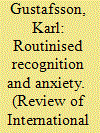

|
|
|
|
|
| Summary/Abstract |
Why do interstate relations deteriorate and become conflictual, even under conditions where one might expect improved ties? The article seeks an answer to this question through a case study of the deterioration in Sino-Japanese relations in the twenty-first century, which took place despite the existence of several factors that might be thought likely to have led to an improvement. Existing theoretical approaches cannot fully explain this puzzle. The article argues that such deteriorations can result from disruptions to states’ reciprocally performed routinised recognition, and identifies three mechanisms through which these can occur. To facilitate this argument, the article draws on scholarship on relational identity, recognition, and ontological security to develop a theory of identity construction that takes account of how self and other routinise the ways in which they recognise each other and how they react to the other’s representational practices.
|
|
|
|
|
|
|
|
|
|
|
|
|
|
|
|
| 11 |
ID:
147544
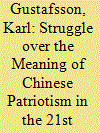

|
|
|
|
|
| Summary/Abstract |
Various definitions are used in research on Chinese nationalism and patriotism, and scholars often distinguish between different types of both. While such research has provided important insights, it pays scant attention to how political actors use terms such as patriotism. This article, by contrast, focuses precisely on how patriotism is used discursively by various Chinese domestic actors in seeking to further their political agendas by promoting their preferred understandings of the term. The article argues that such discursive contestation and struggle is a key aspect of Chinese identity politics that should not be ignored.
|
|
|
|
|
|
|
|
|
|
|
|
|
|
|
|
|
|
|
|
|